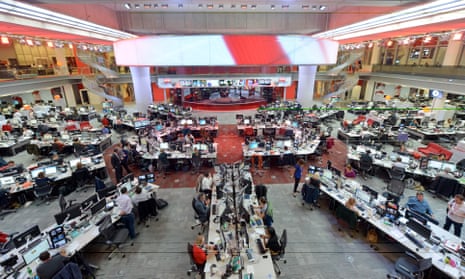Women working at the BBC have spoken of the anger and frustration that has emerged across all levels of the institution after the disparity in pay between the male and female top earners was revealed.
Women said an angry mood had gripped Broadcasting House this week, where staff were “pissed off” but not surprised by the figures, which showed that only a third of the BBC’s 96 top-earning talent were women and that its seven best-paid stars were all men.
A senior female journalist at the BBC said: “Basically we are furious but in a way quietly delighted. Some of us have been ringing each other. The BBC has lied point blank to women and people of colour for years. Even when found out and challenged over blatant pay inequality they keep lying. If you try to challenge it they threaten you. It’s an endless battle. With the obvious exception of the few names on that list you’re never valued.”
She said she knew of “so many personal battles” by female reporters and presenters for equal pay and that “young female producers are kept long term on shabby short-term one or three-month or six-month contracts on rates that haven’t moved for 20 years or more.”
She added: “There’s this great myth management promote about treating talent on its separate merits, but it’s all about divide and rule. Now it’s finally been exposed for what it is. A lot of privileged white men giving each other privileged pay. Even without experience.”
While the list exposed a significant gender pay imbalance – with Claudia Winkleman, the top-earning woman at the BBC paid just a fifth of the £2.2m taken home by Chris Evans, the top-earning man – but many at the BBC said the main source of anger was the vast disparity between what the BBC paid its top stars and what it paid those further down the ladder.
One woman said: “Quite a lot of people are pissed off because of the gender gap, but there are lots of people who are pissed off that this is a big swerve taking the focus off the real story, which is the gap in pay between ordinary producers et cetera and management on six-figure sums.
“People are really really cross. There are brilliant on-air reporters and correspondents who are on £65,000 and £70,000 and they are really angry to see people, women or men, on these big salaries.
“All this means is that women on those programmes identified as gender pay gap will get more money. Men won’t be taking pay cuts, so it will just mean even less money to go round on the troops.”

It was a view echoed by a female radio producer, who worked at the BBC long term on a freelance contract, who said she was “pissed off but not surprised by this because I have no respect any more for the people who decide who gets paid what at the BBC”.
“My experience of being at the BBC is that they do everything to get the maximum out of people for the minimum amount of money and it just really cuts into your self-confidence and worth,” she said. “My work has always been offered to me by males and when I’ve been negotiating my pay, I’ve had them come off the phone and say: ‘Let me see what I can do’, and then they come back offering £5 more a day, because what they’ve offered me is something that works out to about minimum wage.
“I understand that talent needs to get paid for what they do, but the people that are making the content, the people at the bottom, feel like they’re not worth anything, and that’s just been highlighted this week. I’m angry but I’m glad it’s come out.”
Sources said Newsnight’s Emily Maitlis was “really pissed off” after it emerged she was not among those earning above £150,000, while her male colleague on the programme Evan Davis did. However, she is in the midst of renegotiating her contract and it is believed she will take the BBC’s offer and will be appearing on Newsnight next week.
